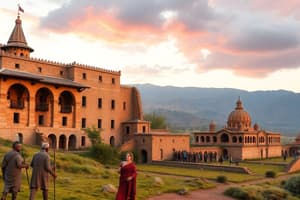Podcast
Questions and Answers
What marks the beginning of Ancient History?
What marks the beginning of Ancient History?
- The invention of writing (correct)
- The rise of feudalism
- The invention of the printing press
- The establishment of city-states
Which period is characterized by feudalism and the spread of Christianity?
Which period is characterized by feudalism and the spread of Christianity?
- Early Modern Period
- Middle Ages (correct)
- Renaissance
- Classical Antiquity
What is a primary source in historical study?
What is a primary source in historical study?
- A documentary explaining events
- An original document from the time (correct)
- An academic article analyzing a period
- A historical textbook
Which significant movement occurred during Modern History?
Which significant movement occurred during Modern History?
What was a key concept during Classical Antiquity?
What was a key concept during Classical Antiquity?
What is historiography?
What is historiography?
Which event is associated with the Renaissance?
Which event is associated with the Renaissance?
What is critical analysis in historical research?
What is critical analysis in historical research?
Flashcards are hidden until you start studying
Study Notes
Overview of History
- Definition: The study of past events, particularly in human affairs.
- Importance: Helps understand cultural, social, political, and economic developments.
Historical Periods
-
Prehistoric Era
- Time before written records.
- Includes Stone Age, Bronze Age, and Iron Age.
- Key developments: tool-making, agriculture.
-
Ancient History
- Begins with the invention of writing (~3500 BCE).
- Major civilizations: Mesopotamia, Ancient Egypt, Indus Valley, China, Mesoamerica.
- Important events: formation of city-states, early empires.
-
Classical Antiquity
- Roughly 8th century BCE to 5th century CE.
- Dominated by the Greeks and Romans.
- Key concepts: democracy (Greece), republic (Rome), philosophical advancements.
-
Middle Ages
- 5th to late 15th century.
- Characterized by feudalism, the spread of Christianity, and the rise of Islam.
- Key events: the Crusades, the Black Death.
-
Renaissance
- 14th to 17th century.
- Rebirth of arts and sciences, humanism.
- Influential figures: Leonardo da Vinci, Michelangelo, Galileo.
-
Early Modern Period
- 16th to 18th century.
- Rise of nation-states, exploration, and colonialism.
- Key events: the Reformation, Enlightenment.
-
Modern History
- 19th century to present.
- Significant developments: industrialization, world wars, globalization.
- Key movements: civil rights, decolonization, technological advancements.
Key Concepts in Historical Study
- Primary Sources: Original documents or evidence from the time (e.g., letters, artifacts).
- Secondary Sources: Analyses or interpretations of primary sources (e.g., biographies, history books).
- Historical Context: Understanding events within the social, political, and economic circumstances of the time.
- Historiography: The study of how history has been written and the different interpretations of historical events.
Methods of Historical Research
- Critical Analysis: Evaluating sources for credibility, bias, and perspective.
- Chronology: Establishing a timeline to understand the sequence of events.
- Comparative History: Analyzing similarities and differences between different historical events or periods.
Importance of History
- Provides insight into human behavior and societal changes.
- Helps develop critical thinking and analytical skills.
- Informs current public policy and societal values by understanding past successes and failures.
Overview of History
- Study of past human events; essential for understanding development in various societal aspects.
- Enhances comprehension of cultural, social, political, and economic changes over time.
Historical Periods
-
Prehistoric Era
- Timeframe precedes written records; comprised of the Stone, Bronze, and Iron Ages.
- Key advances included the innovation of tool-making and the advent of agriculture.
-
Ancient History
- Commences with writing (~3500 BCE) and entails major civilizations such as Mesopotamia, Ancient Egypt, the Indus Valley, China, and Mesoamerica.
- Marked by the emergence of city-states and early empires.
-
Classical Antiquity
- Encompasses roughly the 8th century BCE to the 5th century CE.
- Notable influences from Greek and Roman civilization; notable concepts include democracy and the republic.
- Significant philosophical advancements occurred during this period.
-
Middle Ages
- Lasts from the 5th century to the late 15th century; dominated by feudal structures.
- Characterized by the spread of Christianity and Islam; crucial events include the Crusades and the Black Death.
-
Renaissance
- A cultural resurgence from the 14th to 17th century focusing on arts, sciences, and humanistic thought.
- Figures like Leonardo da Vinci, Michelangelo, and Galileo reshaped societal perspectives.
-
Early Modern Period
- Spans the 16th to 18th centuries; marked by the formation of nation-states, exploration, and colonial expansion.
- Important events included the Protestant Reformation and the Enlightenment.
-
Modern History
- Covers the 19th century to contemporary times; features industrialization, two World Wars, and globalization.
- Highlights movements like civil rights, decolonization, and rapid technological progress.
Key Concepts in Historical Study
-
Primary Sources
- Refers to original evidence such as letters and artifacts from the pertinent timeframe.
-
Secondary Sources
- Comprise analyses and interpretations based on primary sources, like biographies and scholarly history texts.
-
Historical Context
- Entails placing events within the socio-political and economic circumstances of their era.
-
Historiography
- Examines how history has been recorded and interpreted through various perspectives over time.
Methods of Historical Research
-
Critical Analysis
- Involves evaluating sources for authenticity, bias, and perspective to assess reliability.
-
Chronology
- Establishes a timeline for understanding the sequence and interrelation of events.
-
Comparative History
- Analyzes similarities and differences between diverse historical events or periods to draw broader conclusions.
Importance of History
- Offers valuable insights into human behavior and societal transformations.
- Fosters critical thinking and analytical reasoning skills essential for understanding complex issues.
- Informs contemporary public policy and societal values by learning from historical successes and failures.
Studying That Suits You
Use AI to generate personalized quizzes and flashcards to suit your learning preferences.




